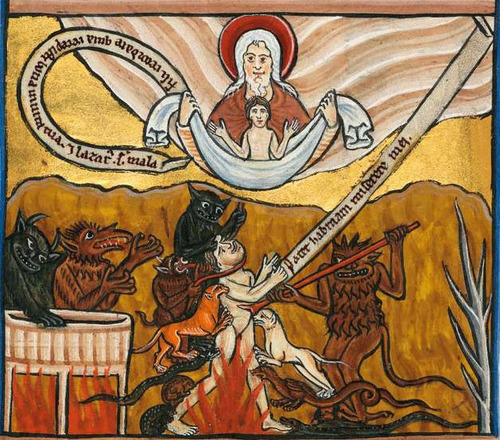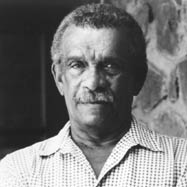
Online Texts for
Craig White's Literature Courses
|
Crusoe's Journal (1965, 1970) by Derek Walcott
|
|
I looked now upon the world as a thing remote, which I had nothing to do with, no expectation from, and, indeed, no desires about. In a word, I had nothing indeed to do with it, nor was ever like to have; so I thought it looked as we may perhaps look upon it hereafter, viz., as a place I had lived in but was come out of it; and well might I say, as Father Abraham to Dives, "Between me and there is a great gulf fixed." Robinson Crusoe ["Father Abraham to Dives": reference to Gospel of Luke 16: 1931, in which a rich man (here called Dives) who suffers in the afterlife begs Abraham in heaven to ease his suffering.]
Once we have
driven past Mundo Nuevo trace
safely to this beat house
perched
between ocean and green, churning forest
the intellect appraises
objects surely, even the bare necessities
5
of style are turned to use,
like those
plain iron tools he salvages
from shipwreck, hewing a prose
as odorous
as raw wood to the adze;
out of such timbers
10
came our first book, our profane Genesis
["our first book": i.e.,
Robinson Crusoe}
whose Adam speaks that
prose
which, blessing some sea-rock, startles itself
with poetry's
surprise,
in a green world, one without metaphors:
15
like Christofer he bears
[Cristofer: Columbus]
in speech mnemonic as
a missionary's
the Word to savages,
its shape an earthen,
water-bearing vessel's
whose sprinkling alters us
20
into good Fridays who recite His praise,
parroting our master's
style and voice, we make his language ours
converted cannibals
we learn with him to eat the flesh of Christ.
All shapes, all
objects multiplied from his,
our ocean's Proteus;
[Proteus: shape-shifting sea-god in early Greek
mythology]
in childhood, his derelict's old age
was like a
god's. (Now pass
in memory, serene parenthesis,
30
the cliff-deep leeward coast
[leeward: not exposed to wind]
of my own
island filing past the noise
of stuttering canvas,
some noon-struck
village, Choiseul, Canaries, [Choiseul: city in St.
Lucia, Caribbean; Canaries: island chain off Africa]
crouched
crocodile canoes,
35
a savage settlement from Henty's novels,
[G.A. Henty, 1832-1902, historical adventure novelist]
Marryat or R.L.S., [Frederick
Marryat, 1792-1848, author of popular sea stories; R.L.S.: Robert Louis
Stevenson, 1850-94]
with one boy signalling at the sea's edge,
though what he cried is lost.)
So time, that makes us objects, multiplies
40
our natural loneliness.
For the hermetic
skill, that from earth's clays
shapes something without use,
and,
separate from itself, lives somewhere else,
sharing with every beach
45
a longing for those gulls that cloud the
cays [cays = sandbanks]
with raw, mimetic cries,
never surrenders wholly, for it knows
it
needs another's praise
like hoary, half-cracked Ben Gunn, until it cries
[Ben Gunn: castaway character in Stevenson's
Treasure Island]
50
at last, "O happy desert!"and learns again the self-creating
peace
of islands. So from this house
that faces nothing but the sea,
his journals
assume a household use;
we learn to shape from them,
where nothing was
55
the language of a race,
and since the
intellect demands its mask
that sun-cracked, bearded face
provides us
with the wish to dramatize
ourselves at nature's cost,
60
to attempt a beard, to squint through the
sea-haze,
exposing as naturalists,
drunks, castaways, beachcombers,
all of us
yearn for those fantasies
of innocence, for our faith's
arrested phase
65
when the clear voice
startled itself
saying "water, heaven, Christ,"
hoarding such heresies as
God's
loneliness moves in His smallest creatures

medieval Bible illustration of parable of Dives and Lazarus, Luke 16:19-31
